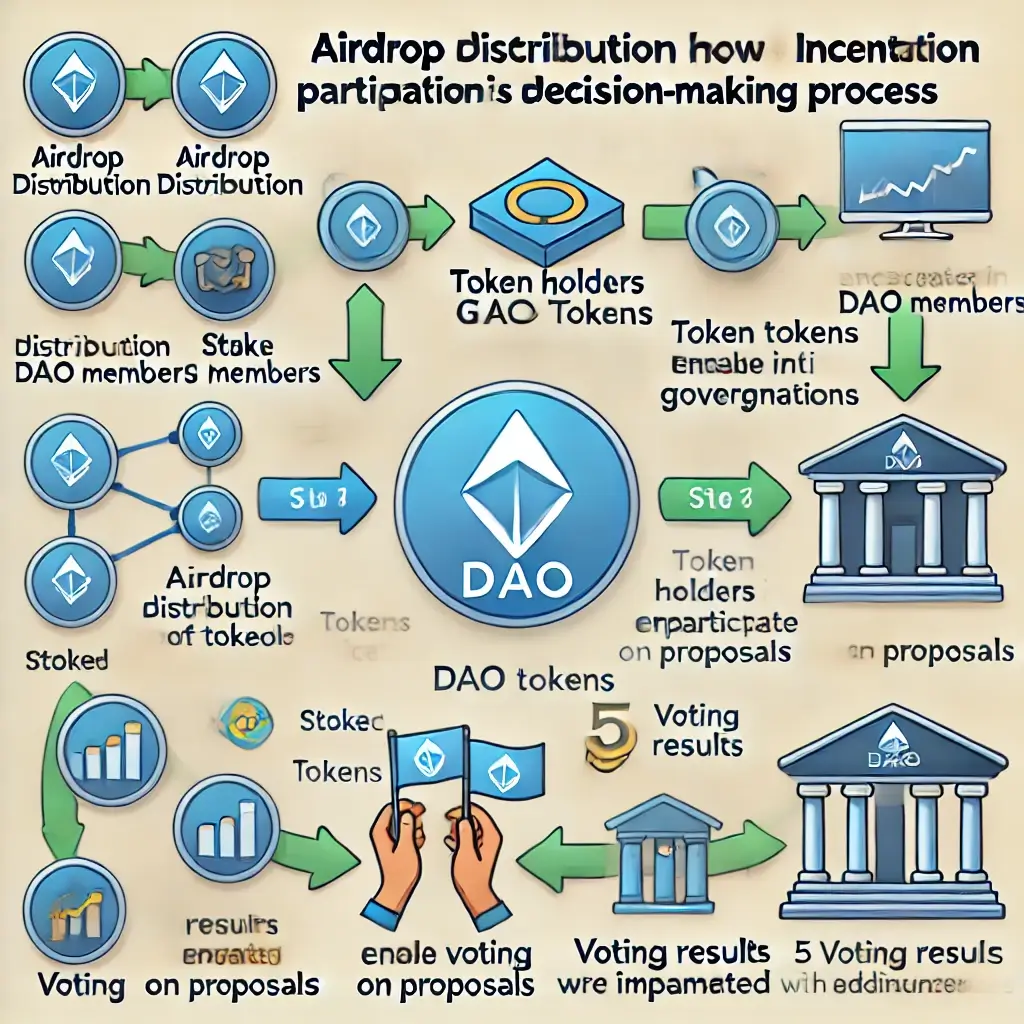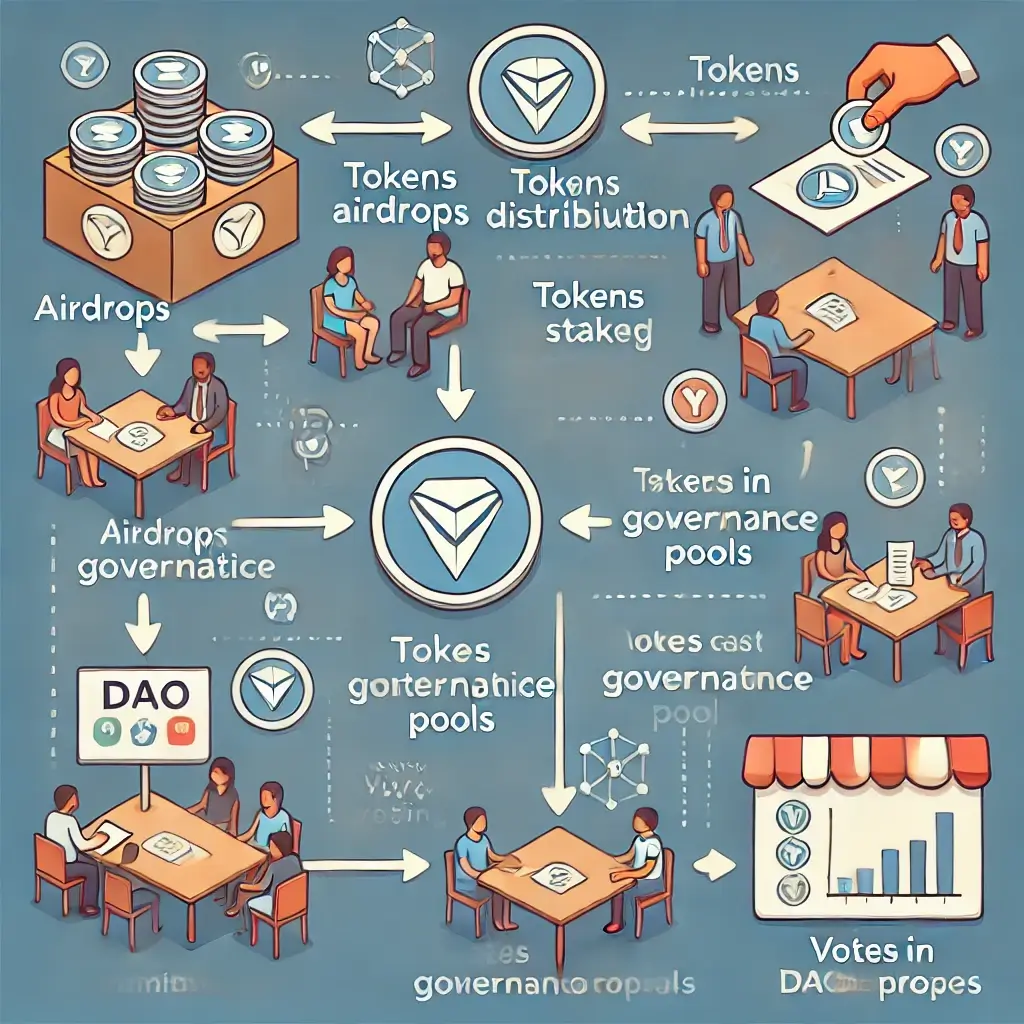Airdrops and Decentralized Autonomous Organizations (DAOs) are transforming the landscape of blockchain governance. DAOs, which allow token holders to participate in decentralized decision making, are using airdrops to increase participation, decentralize governance, and reward contributors. Airdrops are distributions of free tokens, and they are emerging as a key tool for promoting engagement in DAOs.
In this article, we’ll explore how airdrops impact DAOs. We’ll dive into how airdrops are shaping the structure, governance, and community involvement in decentralized organizations. By looking at examples, we’ll understand how airdrops are improving decision-making and the overall health of DAOs.
1. What Are Airdrops, and How Do They Connect to DAOs?
Airdrops involve distributing free tokens to individuals, often to promote a new cryptocurrency or project. In DAOs, these tokens are typically used to vote on proposals, make decisions, and shape the direction of the organization. Token holders in a DAO hold governance power, and this power is often proportional to the number of tokens they hold.
Airdrops help expand the number of token holders in a DAO, making the governance process more decentralized and inclusive. They enable more participants to join and take part in decisions that affect the project’s future. Instead of relying on a small group of early investors, DAOs can create a broader community of decision-makers.
Example: Uniswap’s UNI Airdrop
In September 2020, Uniswap, a leading decentralized exchange (DEX), airdropped 400 UNI tokens to every user who had interacted with the platform. This airdrop helped distribute tokens widely and boost participation in the platform’s governance. As a result, token holders could vote on important matters like protocol upgrades.
This example highlights how airdrops can help DAOs ensure community participation in governance. With more tokens in the hands of users, decision-making becomes more democratic and less concentrated.
2. How Airdrops Boost Community Engagement
One of the most significant challenges for DAOs is ensuring that token holders actively participate in governance. Many users hold tokens but don’t engage in voting or decision-making. Airdrops can help increase participation by attracting new members or encouraging existing members to take part in governance.
Airdrops increase the number of token holders who can engage in governance decisions. By receiving free tokens, more people are incentivized to vote, propose changes, and contribute to the DAO’s growth.
Example: MakerDAO and Community-Driven Governance
MakerDAO, known for its DAI stablecoin, used airdrops to encourage wider participation in governance. In 2021, MakerDAO conducted an airdrop to target a broader community of Ethereum users. This increased participation in the voting process, which led to better-informed decisions on collateral risk parameters and other protocol upgrades.
Airdrops in this case helped MakerDAO build a more diverse governance body, making it more resilient and representative of the broader community.
3. Airdrops: A Tool for Decentralizing DAO Governance
In traditional organizations, decision-making power is often concentrated in the hands of a few. DAOs aim to break this pattern by distributing governance tokens among the broader community. However, many DAOs still face a concentration of power, with a small number of token holders controlling the majority of votes.
Airdrops help solve this problem by distributing tokens more evenly. By giving tokens to a broader audience, DAOs can prevent centralized decision making and ensure that the entire community has a say in the organization’s direction.
Example: Aave and Governance Expansion
Aave, a decentralized lending platform, used airdrops to expand participation in its governance. Aave distributed AAVE tokens to users who had interacted with the platform. As a result, more people could take part in votes on protocol changes, like interest rate adjustments and new collateral types.
This approach ensured that Aave’s governance process was not dominated by a small group of wealthy stakeholders. Instead, it promoted a more balanced decision-making process and allowed a wider range of users to have a say.

4. Airdrops as Incentives for DAO Participation
In addition to promoting governance, airdrops can be used to incentivize community involvement. DAOs can distribute tokens to encourage specific actions, such as voting, participating in discussions, or contributing to development.
Incentivizing actions through airdrops can help DAOs grow and ensure that users are actively engaged in building the project. By rewarding users with tokens, DAOs foster a self-sustaining cycle where active participants are motivated to stay involved.
Example: Compound’s Governance and Incentive Model
Compound, a decentralized finance protocol, uses COMP tokens to incentivize participation in governance. Users who supply or borrow assets on Compound receive COMP tokens, which can be used to vote on proposals or adjust protocol parameters. This incentive structure encourages users to be actively involved in shaping the protocol’s future.
This type of reward system ensures that Compound’s decision-making is driven by active stakeholders who care about the platform success, rather than by passive token holders.
5. Challenges of Airdrops in DAO Governance
Despite their benefits, airdrops also come with challenges. One concern is the rise of airdrops farming, where users participate solely to receive free tokens without caring about the project. These short-term participants can disrupt governance by voting on issues without a genuine interest in the project’s long-term success.
Another challenge is that airdrops may still concentrate power among a few large recipients. Even though airdrops aim to distribute tokens more widely, they may still inadvertently favor large token holders or those with early access to the project.
Example: Risk of Token Hoarding
In some cases, recipients of airdropped tokens might hoard them rather than using them for governance. This leads to low voter participation, as the active voting pool remains limited to a few participants. This can undermine the goal of decentralization and equal participation.
To mitigate this, some DAOs implement strategies like time-locked tokens, ensuring that airdropped tokens can’t be immediately sold or moved. This encourages long-term participation and prevents manipulation by short-term speculators.
6. The Future of Airdrops in DAOs
As DAOs continue to evolve, airdrops will play an increasingly important role. Future airdrops may be designed to reward specific behaviors, such as contributing to development, attending governance meetings, or providing liquidity to the platform.
DAOs may also introduce dynamic token models, where airdrop rewards depend on users’ ongoing involvement in the DAO. This would ensure that tokens are distributed to those who actively contribute to the project rather than those who simply collect free tokens without participating.
Example: MolochDAO and Dynamic Governance
MolochDAO, a DAO dedicated to funding Ethereum-based projects, has experimented with dynamic token distribution models. Contributors who have actively supported projects receive additional governance tokens, thus increasing their influence in decision-making. This model ties governance power to actual contributions, ensuring that those who help build the DAO’s success have the most influence.
Conclusion
Airdrops are reshaping the way DAOs function. By distributing tokens more widely, airdrops help expand participation, decentralize governance, and reward contributors. However, they come with their challenges, such as airdrop farming and power concentration. DAOs must carefully design their airdrop strategies to ensure long-term engagement and genuine involvement.
In the future, airdrops will continue to play a vital role in shaping the decentralized organizations of tomorrow. By incentivizing active participation and distributing tokens fairly, airdrops can foster a truly decentralized and inclusive governance model.
For more insights on DAOs and cryptocurrency governance, visit our Cryptocurrency Comparisons Guides.
Stay Updated:
For the latest news on crypto airdrops and blockchain innovation, follow us on:
Special Offer:
Want to trade your newly acquired tokens? Sign up on Bybit today and claim up to $30,000 in deposit bonuses!

















